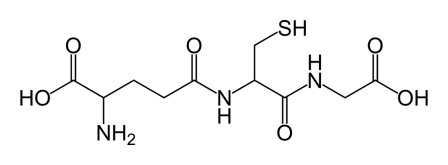

Some Basics
For the non science lingo watch this video cartoon about the basics of glutathione (the company that made this video also manufactures and sells glutathione , but this video is still helpful, we believe)
For the technical folks-
Glutathione is a tri-peptide which is a combination of 3 amino acids (the building blocks of protein): Glycine, Cysteine, and Glutamic acid. The cysteine amino acid contains a sulfur group responsible for the chemical properties of the whole glutathione protein. The other 2 amino acids: glutamic acid and glycine, are non-essential amino acids which means that they are manufactured by the body (yet also available through food).
Cysteine is ALSO classified as a non-essential amino acid because it can be produced in the body from another amino acid – methionine. BUT methionine is an “essential amino acid” because the body does not produce it, meaning that WE must get a supply of it, exclusively through the food we eat.
In this way methionine may serve as a building block for Glutathione as well, but it also has a tendency to convert into homocysteine, which increases the risk of heart disease. That is why excessive consumption of methionine is not advisable, and methionine cannot be viewed as a building block for Glutathione.
For a cell to be able to manufacture Glutathione these three GSH precursors – glutamate, glycine and cysteine – absolutely must be in a form that can be transported from the mouth, through the digestive system, into the blood and finally through the cell wall where they are combined into Glutathione.
Cysteine is a limiting factor for GSH because:
“For our bodies to sustain healthy glutathione levels, the limiting factor in our daily intake of food is usually the amino acid cysteine. It must be in a form that can survive the trip from our mouths to our cells. Unfortunately, merely eating either glutathione or the free amino acid cysteine does not give the cell what it needs to manufacture glutathione.”
–Dr. Jimmy Gutman “Glutathione. Your Key To Health”
“(the problem) is that cysteine does not survive the trip to the cell through the digestive system very well. Most cysteine is broken down or altered somewhere along the long trip from the mouth to the cell. That is why it is important to consume cysteine in a form that resists alteration and is strong enough not to be broken down in the digestive tract.”
The AID’s and ABC’s of Glutathione
To remember what Glutathione does in your body (according to Dr. Gutman)
remember the word AID:
A– antioxidant, the MASTER ANTIOXIDANT in fact, none of the other antioxidants in your body could work without Glutathione.
I– Immune System, Glutathione is the Fuel for the Immune System
D– Detoxification- levels of Glutathione are highest in your Liver and help rid your body of toxins- from cigarette smoke, to pesticides, to heavy metals, to impurities in food and water. Dr.Gutman says it is the most important detoxifier second only to WATER.
Another site- http://www.themaxsite.com/glutathione.html
talks about the ABC’s of Glutathione:
Glutathione’s three major roles in the body are summarized by the letters A-B-C.
Anti-oxidant
Blood Booster
Cell Detoxifier
These are the three critical processes driven by glutathione.
What other Doctors are saying about Glutathione…
Many others in the medical community are talking about the importance of Glutathione and I have included videos about what they are saying here:
Dr. Keller (For those in the MITOCHONDRIAL community…this is an important one- as he states, Glutathione is the MAJOR PROTECTOR of Mitochondrial DNA)
Glutathione and the Autism Community
Dr. Jill James at Arkansas Children’s Hospital has done a tremendous amount of research on Glutathione (as well as folate and methionine metabolic cycles) and Autism.
Here is one paper by James that talks about low glutathione (along with low methionine, homocysteine, cysteine,etc.) in autistic children, and an interview with her about her findings
Dr. Guillford –
Glutathione and the Mitochondrial Community
EPI 743 is a pharmaceutical that is in clinical trials for MITOCHONDRIAL DISEASE by Edison Pharmaceuticals. A Press release was recently published showing its success in treating Leigh’s Disease Mitochondrial Patients.
While reading about EPI and reading some papers published by one of it’s principal investigators, Dr. Gregory Enns, a common theme emerged: GLUTATHIONE.
EPI-743 is an orally bioavailable small molecule being developed by Edison Pharmaceuticals for the treatment of Leigh syndrome and other inherited mitochondrial diseases. EPI-743 is a member of the para-benzoquinone class of drugs. It serves as a cofactor for the novel drug target– NADPH quinone oxidase 1 (NQO1). Through a redox-based mechanism, EPI-743 augments endogenous glutathione biosynthesis– essential for the control of oxidative stress.
Glutathione and it’s impact on other disorders
This website (although selling a glutathione product) has a comprehensive list of published literature articles with references on the links between glutathione depletion and other disorders such as: cardiovascular disease, diabetes, HIV, cystic fibrosis, cancer, Lyme disease, digestive disorders, and hepatitis.
Another excellent site with info about Glutathione and Disease and Longevity.
This article gives a nice overview of other conditions including agin that may be impacted by glutathione status.
Here is another site I JUST came across that has an EXHAUSTIVE list of other disorders linked to LOW Glutathione…
If you have never heard of Glutathione until now, I promise you this will not be the LAST time you have heard of it, and in the coming years I predict you will not have to look very far to hear something about the MIGHTY {G}!
just doing an informal survey… please leave a comment stating if you have heard of GLUTATHIONE and if so when/how you learned about it! Thanks!

